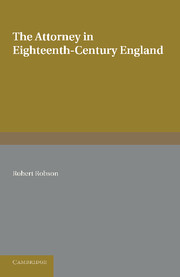Book contents
- Frontmatter
- Dedication
- Contents
- General Editor's Preface
- Preface
- Chapter I Attorneys and Solicitors Before 1700
- Chapter II Regulation of the Profession
- Chapter III The Society of Gentlemen Practisers
- Chapter IV The Provincial Law Societies
- Chapter V The Making of an Attorney
- Chapter VI The Attorney in Local Society
- Chapter VII Estates and Elections
- Chapter VIII Administration and Finance
- Chapter IX Two Attorneys
- Chapter X The Road to Respectability
- Appendix I The Apprenticeships of Richard Carre and Samuel Berridge
- Appendix II The Admission of an Attorney
- Appendix III Christopher Wallis: Notes from the Journal
- Appendix IV A Note on Numbers
- Appendix V The Professions in the Eighteenth Century: a Bibliographical Note
- List of Primary Sources
- Index
Chapter VI - The Attorney in Local Society
Published online by Cambridge University Press: 05 June 2016
- Frontmatter
- Dedication
- Contents
- General Editor's Preface
- Preface
- Chapter I Attorneys and Solicitors Before 1700
- Chapter II Regulation of the Profession
- Chapter III The Society of Gentlemen Practisers
- Chapter IV The Provincial Law Societies
- Chapter V The Making of an Attorney
- Chapter VI The Attorney in Local Society
- Chapter VII Estates and Elections
- Chapter VIII Administration and Finance
- Chapter IX Two Attorneys
- Chapter X The Road to Respectability
- Appendix I The Apprenticeships of Richard Carre and Samuel Berridge
- Appendix II The Admission of an Attorney
- Appendix III Christopher Wallis: Notes from the Journal
- Appendix IV A Note on Numbers
- Appendix V The Professions in the Eighteenth Century: a Bibliographical Note
- List of Primary Sources
- Index
Summary
THE country attorney was an important figure in provincial society in the eighteenth century. His professional concerns placed him at the centre of affairs in many localities, and by the end of the century he was often to be found among the more energetic leaders of a greatly enriched provincial life. The evidence for this is scattered through all the specialised histories of the period, histories of families, estates, banking, commerce and politics. Indeed, a large part of the flesh which the local historians are attaching to the bones of eighteenth-century English history is based on documents which have come to the various record offices from solicitors' attics and strong-rooms. Even the catalogue of any one of these deposits gives a very clear picture of the great variety of ways in which the attorneys touched the life of the community in which they lived. The lists of the Tibbitts Collection at Sheffield may be taken as an example.
These are the professional papers of a Sheffield attorney of the eighteenth century, Samuel Dawson, and of his predecessors and successors in the practice. There are a great number of deeds of all kinds, principally relating to Yorkshire, but occasionally to other parts of the country. There are copies of wills, leases and agreements; papers relating to partnerships of linen drapers, runners and casters of steel; a draft agreement of twenty-seven butchers to avoid causing nuisances with the garbage from the slaughter house; appointments of the surgeon of the workhouse; the papers relating to the Earl of Shrewsbury's Hospital in Sheffield; documents concerning the Cutlers' Company of Sheffield, lead mining, turnpike trusts, the Dove and Dearne Canal, the River Dun Navigation Company, and parish business of all kinds—apprenticeship indentures of pauper children, settlement disputes, disputes about rights of way, indictments for not repairing highways. There are papers relating to various criminal cases, and to cases of slander heard in the Consistory Court at York. The concern of Dawson and his colleagues with manorial business is shown in many ways— court rolls, rentals, presentments, maps, plans, and surveys are all carefully preserved. There is evidence of the work of this firm as clerks to the Town Trustees.
- Type
- Chapter
- Information
- The Attorney in Eighteenth-Century England , pp. 68 - 83Publisher: Cambridge University PressPrint publication year: 2013



